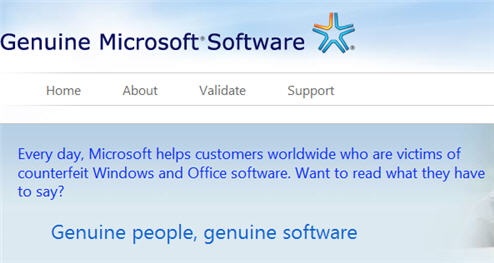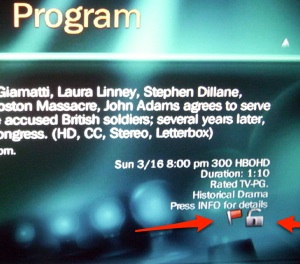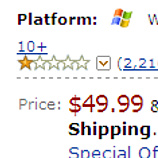Update: It turns out the special chips used in the headphone controls of the third generation Shuffle don’t contain any DRM after all, so any attempts at reverse-engineering won’t bring on the wrath of the DMCA.
piracy

End-User License Agreement Requires You To "
One of the bloggers at BoingBoing attempted to install World of Warcraft on his Ubuntu Linux laptop, but first he had to agree to… something. Full picture inside.

If You Can't Find That DVD Set Anywhere Else, Maybe It's Pirated
Phil found out that you don’t order DVDs from websites that look like this, or that offer sets that aren’t for sale elsehwere. Now his wife is the proud owner of some homemade discs with low-quality TV footage of the series and a “TBS” bug in the corner.

Hot Topic Steals Yet Another Design And Sells It As Its Own
Once again, Hot Topic is selling someone else’s art as original work. The mallternative retail chain purchased the supposedly original design from Newbreed Girl, which has its own history of ripping off designs.

RIAA To Stop Suing File Sharers
The Wall Street Journal and Ars Technica are reporting that the RIAA has announced a fairly dramatic change in its strategy to fight piracy.

Help! I Bought A Pirated Copy Of Windows!
Emily bought a very “high quality” pirated copy of Windows from an Amazon seller and didn’t realize that anything was amiss for an entire year.

Walmart Shuts Down Music Store, Deactivates DRM-Protected Songs
Last week, Walmart sent out emails to its online music store customers letting them know that on October 9th, 2008, they will no longer be able to play any DRM-crippled tracks. Unlike Yahoo, which did the right thing by offering free replacement downloads of unprotected songs when they killed their DRM program, Walmart simply brags about its new unlicensed model and tells you to burn your protected tracks to CD if you really want to listen to them in the future. Good job, Walmart, there goes another betrayed consumer into the welcoming arms of digital piracy. And another. And another…

Yahoo Offers Coupons To Let Customers Download DRM-Free MP3s
When Yahoo announced last week that they were turning off their DRM-restricted music store store in September, thereby abandoning customers with songs that would no longer play, people were understantably angry. At the time, Yahoo suggested you burn the songs to CD while you still can, then re-rip them into unprotected MP3 files—but that was a lousy solution that took time and money, and resulted in lower-quality audio files. Now they’ve come back with a proper solution that seems to more than make up for the trouble—especially if we can believe what their spokesperson told the LA Times.

RIAA Pulls Case Before It Can Be Dismissed, Then Refiles Days Later To Get Different Judge
If you were still somehow unconvinced that the RIAA’s legal strategy is “be sleazy, intimidate, then profit,” their latest legal maneuvering might finally convince you. Next week, a judge was to decide whether their case against a New York family should be thrown out—the family’s lawyer, RIAA critic Ray Beckerman, argued “that if the RIAA can’t prove anybody downloaded the music from an open share folder, then the case would have to be dismissed.”

Arizona Judge Rejects RIAA's "Shared Directory = Piracy" Argument
Although it won’t affect other cases, the RIAA was handed a small smackdown this week when a U.S. district judge rejected their request for a summary judgement, and ruled that putting song files in a shared directory was not enough proof that infringement had occurred.

HBO Using Tivo's Macrovision DRM To Restrict "John Adams" Miniseries?
When Dean recorded HBO’s new Tom Hanks-produced miniseries “John Adams”—which is not a pay-per-view or on-demand program—he was surprised to see it was flagged by Tivo’s Macrovision software, which controls how many times you may watch a program and how long you can store it before it’s automatically deleted. Now the question is, was this a mistake on the part of HBO or Dean’s cable provider Comcast? Or—considering HBO’s infamous anti-consumer stance on time-shifted programming—is it the beginning of a sneaky “back-door” approach to locking down all their content, something Tivo’s own people said would probably not happen when they added Macrovision to their recorders in 2004?

House Passes Bill That Would Require Colleges To Practice Network Filtering
Last week the House voted 354-58 to approve a college funding bill that requires colleges to “make plans to offer some form of legal alternative to P2P file-swapping” and to implement some form of network filtering. Luckily for sane people everywhere, the White House has already made veto-noises at the bill for other reasons—but still, the MPAA came that much closer to forcing its admittedly false worldview on universities.

Verizon To Hollywood: We're Not The Piracy Police
AT&T and Comcast may be willing to help Hollywood control piracy on their networks, but Verizon wants none of it, says the New York Times.

MPAA Takes Unfairly Blaming College Students For Illegal Downloading Very Seriously
BONUS QUOTE:“Illegal peer-to-peer file-sharing is a society-wide problem. Some of it occurs at college s and universities but it is a small portion of the total,” [Terry Hartle ,vice president of the American Council on Education] said, adding colleges will continue to take the problem seriously, but more regulation isn’t necessary.

RIAA Sends Out Fake News Clip To TV Stations
The RIAA wants you to know that everyone loses with pirated products, so they’ve put together a fake news story and sent it out to TV stations around the country—maybe it will show up on your cash-strapped local news over the next few days, if you’re lucky. We’re torn, though, on posting this because it’s being leaked (promoted?) heavily by the video news release (VNR) company that produced it—we want you to scoff at it with us, but keep your bullshit “stealth marketing” sensors up.

Article Recounts Sony's Rootkit Debacle In Detail
Remember Sony’s cringe-inducing copy protection scheme a couple of years ago, where they secretly installed rootkits on millions of customers’ PCs and then pretended it was no big deal? (“Most people, I think, don’t even know what a rootkit is, so why should they care about it?” — Thomas Hesse, Sony BMG’s President of Global Digital Business.) There’s a new article (PDF) about to be published in the Berkely Technology Law Journal called “The Magnificence of the Disaster: Reconstructiong the Sony BMG Rootkit Incident.” It’s a very detailed and entertaining read that examines the conditions that led Sony BMG “toward a strategy that in retrospect appears obviously and fundamentally misguided.”




